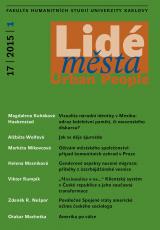Genderové aspekty nucené migrace
Příběhy z ázerbájdžánské vesnice
DOI:
https://doi.org/10.14712/12128112.3412Klíčová slova:
forced migration, household economics, gender roles, AzerbaijanAbstrakt
This case study focuses on a variety of adaptation strategies responding to the economic uncertainty caused by forced migration in the post-Soviet Azerbaijan and their impact on gender. Liminal form of forced migration process contributes to the transformation of the ways of making a living and causing a negotiation of gender boundaries. These become more flexible and permeable but they are still constrained by socially shared and reproduced images of the ideal division of gender roles. I will illustrate longterm consequences of forced migration and negotiation of gender roles in three stories of households living in the rural foothills of Nagorno-Karabakh, where I conducted repeated long-term ethnographic research.
Stahování
Publikováno
Jak citovat
Číslo
Sekce
Licence

Tato práce je licencována pod Mezinárodní licencí Creative Commons Attribution-NonCommercial-NoDerivatives 4.0.


